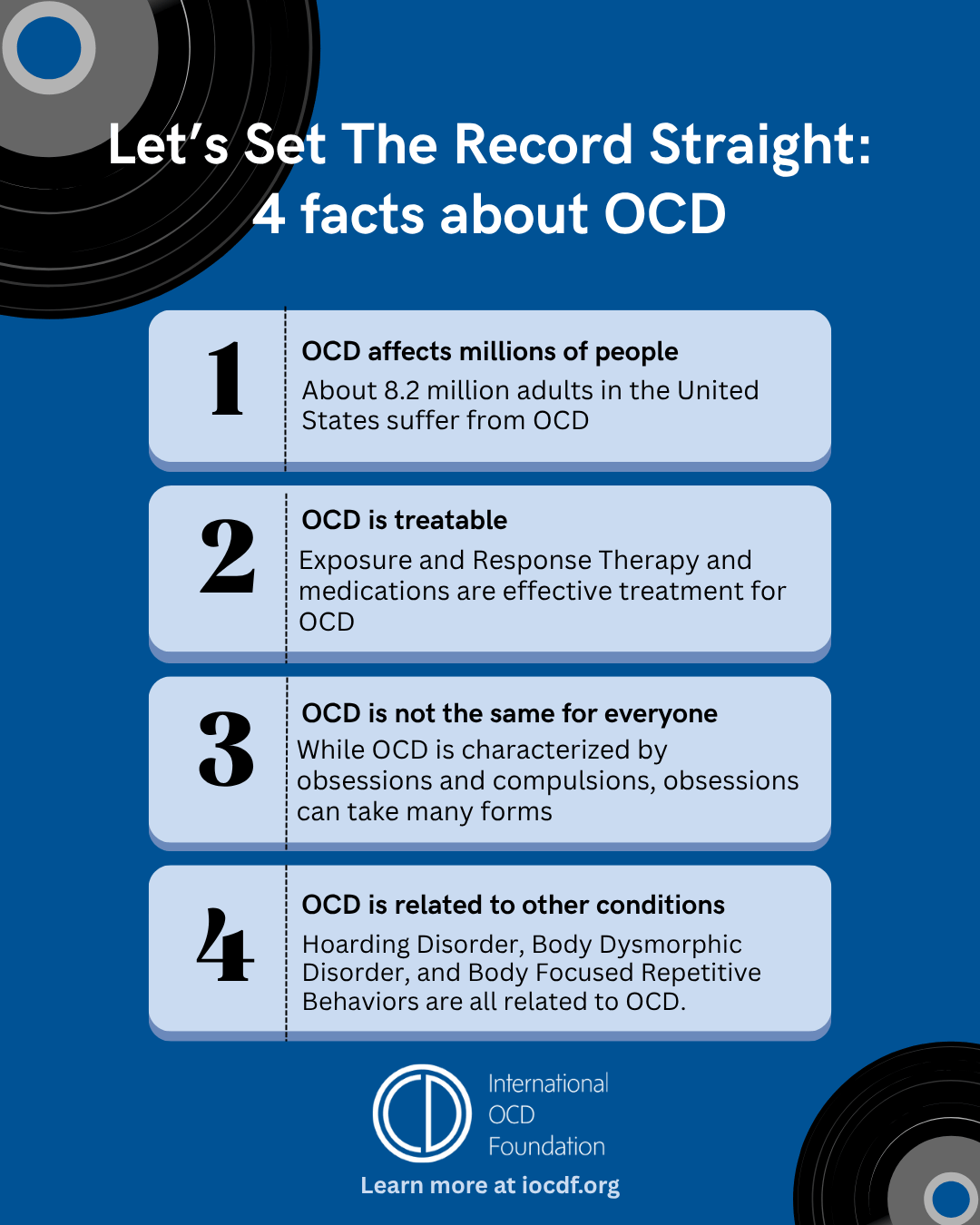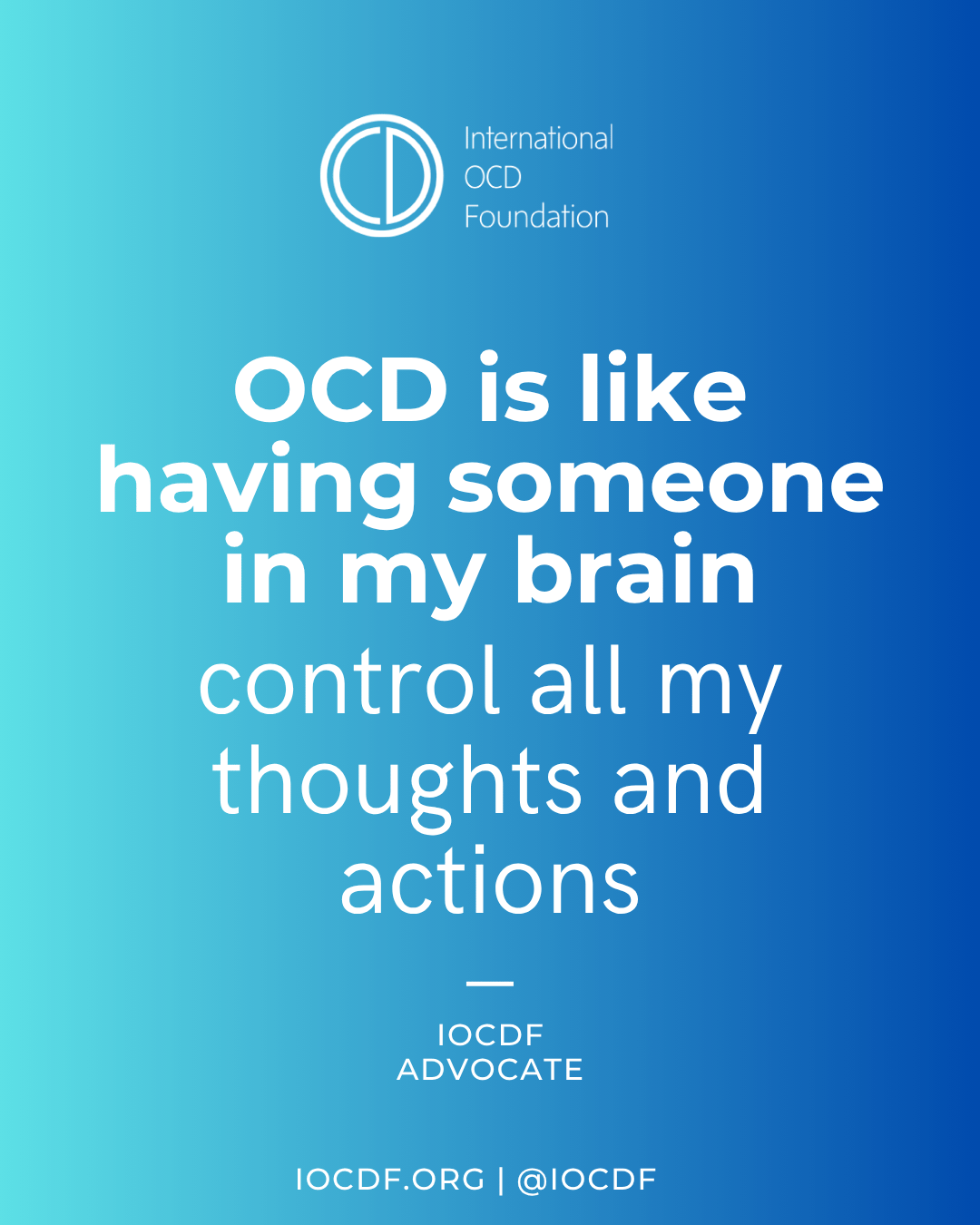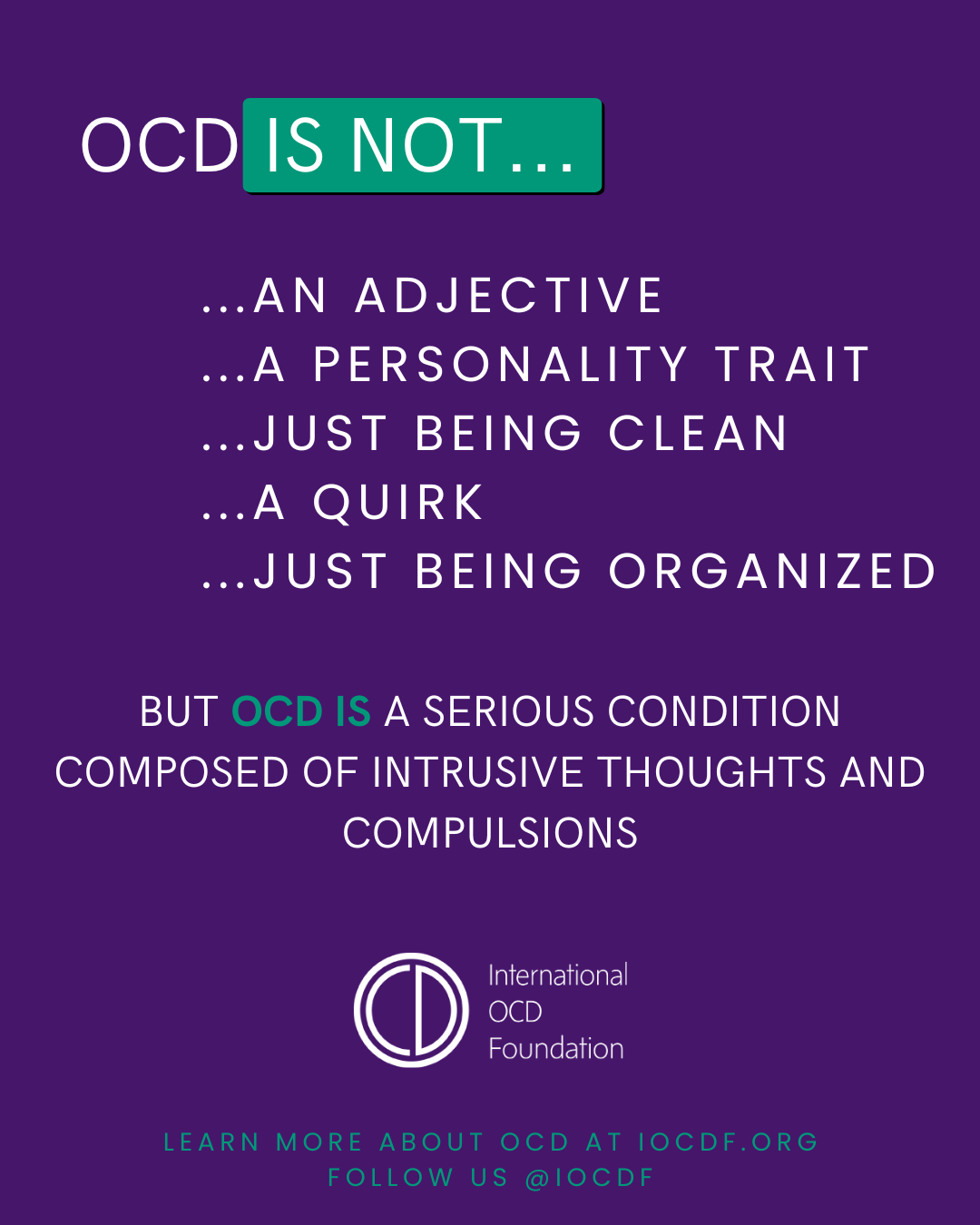Introduction
Obsessive compulsive disorder (OCD) is a serious and often misunderstood mental health condition where people experience intrusive and unwanted thoughts (obsessions) and perform repetitive behaviors to minimize the anxiety caused by obsessions (compulsions). These symptoms can deeply interfere with relationships, work, school, and daily functioning, yet OCD is still underdiagnosed, undertreated, and surrounded by stigma.
The International OCD Foundation believes that grassroots advocates are essential to create a world where people with OCD are met with support. Advocacy is a powerful tool to change this narrative. Through advocacy, we can:
- Raise public awareness about the signs, symptoms, and misconceptions of OCD.
- Reduce stigma so people suffering feel comfortable asking for help.
Engagement around public policy can lead to changes that improve access to evidence-based treatment, increase research funding, protect people with OCD in schools and workplaces, and more. Whether you are new to public policy advocacy or already involved, this toolkit is a guide to making a difference. Click on the tabs below to get started.
Tips for Engaging in Advocacy
Expand- Educate Yourself:
- Learn about OCD: Understand the symptoms of OCD and how it can impact sufferers, as well as their friends and family.
- Understand our message: Make sure you review and understand the core messages about OCD and treatment.
- Tell Your Story:
- Tell your story: Sharing personal experiences can make mental health challenges more relatable and help break down stigma.
- Use respectful language: Speak thoughtfully about OCD and avoid stigmatizing terms, and don’t hesitate to nicely correct inaccurate information.
- Advocate for Policy Change:
- Contact your elected officials: Share your story and facts about OCD with your elected representatives. By speaking openly about your OCD story with lawmakers, you not only influence policy—you help build community and encourage others to speak up too.
- Think local: Lawmakers prioritize the voices of their own constituents, living in their community. As you begin your advocacy efforts, be sure to contact senators and representatives from your state and district—they are far more likely to listen and respond to the concerns you raise on behalf of people living with OCD.
- Speak about what you know: Your personal experience is one of the most powerful tools in advocacy. When speaking with lawmakers, share your story. Whether you’re living with OCD, supporting someone who is, or working in the mental health field, personal stories make the issue real, relatable, and memorable, helping policymakers understand the true impact of OCD and the need for change.
- Take Care of Yourself:
- Set realistic goals: Don't overextend yourself and prioritize your own mental health.
- Seek support when needed: Don't hesitate to reach out to friends, family, or a mental health professional for support.
- Utilize Social Media:
- Share information and resources: Use social media to raise awareness about OCD, your affiliate and the IOCDF, and share valuable information.
Follow the International OCD Foundation: Stay informed and connected with the IOCDF community via Instagram, Facebook, X, YouTube, and Twitch (@IOCDF).
What Is OCD?
ExpandObsessive compulsive disorder (OCD) is a serious mental health condition where people experience intrusive and unwanted thoughts (obsessions) and repetitive behaviors (compulsions), causing significant distress and interfering with daily life.
Contamination Obsessions
|
Violent Obsessions
|
Responsibility Obsessions
|
Perfectionism-related Obsessions
|
Sexual Obsessions
|
Religious/Moral Obsessions (Scrupulosity)
|
Identity Obsessions
|
Other Obsessions
|
- About 1 in 40 adults currently have OCD. That’s over three million adults in the United States, or the populations of Phoenix, AZ and Philadelphia, PA combined.
- About 2.2 million children in the United States have OCD.
- OCD affects men, women, and children of all races, ethnicities, and backgrounds.
- On average, it takes over 7 years for an individual to receive an accurate OCD diagnosis.
- More than ⅔ of the public cannot accurately identify OCD.
- The obsessions and compulsions of OCD are ego-dystonic, as people with OCD are distressed by the content of their intrusive thoughts and would truly prefer not to do the compulsive behaviors or have the compulsive thoughts that keep their distress at bay for a moment. Something that is “ego-dystonic” is separate or opposite of what someone truly agrees with, desires, believes in, and values.
- There are effective treatments for OCD
|
- There are many disorders that are related to OCD, including, but not limited to:
|
Challenges for people with OCD:
- Public recognition of OCD and related disorders: Not enough people have an accurate understanding of OCD. More than ⅔ of the public cannot accurately identify OCD. This misunderstanding of the disorder results in stigma, misuse of the term in casual conversation, and delays in diagnosis and treatment of people with OCD, making one’s OCD journey even more challenging.
- Access to effective treatment: Due to stigma and public misconceptions of OCD and related disorders, it takes an average of seven years for an individual to receive an accurate OCD diagnosis.
- Advancing research: We need to know more about the causes and treatments for OCD. Research funding is disproportionately low compared to disorders with similar or lower prevalence rates.
Letters to Congress
ExpandEffective Ways to Communicate with Elected Officials and Staff
Find your representatives in Congress using the IOCDF Action Center: https://iocdf.org/take-action/#/
Find your local elected officials (state, county, municipal): https://www.usa.gov/elected-officials
Tips
- It is not unusual for officials in higher office to ask a member of their staff to meet with constituents on their behalf. This still counts as a helpful touch point!
- It can take up to 2 weeks to receive a response, and it is not effective to send numerous communications. If you do not hear back after 2 weeks, it is acceptable to reach out again (suggest by phone).
- If you have a connection with a lawmaker, it is acceptable to let those connections know you are seeking a meeting. But, you still need to follow the preferred process to request a meeting.
- When you do get a meeting scheduled, expect it to last roughly 15 minutes either via virtual meeting or in person.
Complete a request form online
Most elected decision-makers have an official webpage (often on your local state government website) where you can submit an online form requesting a meeting. You will likely be asked for your full name, your address and the reason you are asking for a meeting. Suggested language: I would like a few minutes to share information with you about Obsessive Compulsive Disorder and how it affects our local community. I am a volunteer with (either the International OCD Foundation or local affiliate name), and we do not have a specific ask at this time other than raising awareness about OCD.
Phone calls to a legislator
State your name and address and identify yourself as the legislator’s constituent. You will often be speaking with a secretary or aide. Briefly make known your position as they keep track of the issues that people will call about to report to the legislator. Have your thoughts organized in advance, which will help you keep the call brief and to the point. It is also very helpful to share how the issue affects you personally. Thank them for their support.
Sending an email communication to a legislator
Before sending an e-mail, you might want to call the legislator’s office and ask if a letter sent by email is effective. If you do send an email, send it to the representative. Do not copy other representatives or send a mass e-mail. Make it a brief message with no special layouts or graphics. Do not include attachments. Include your full name and address so it is clear that you are a constituent, and ask for a response. You might also want to send a hard copy of your e-mail to the legislator.
Writing a letter to a legislator – works best if you advocating for a specific type of policy or legislation
- Use the proper salutation, for example, The Honorable (first name)(last anime) Address City, State, Zip code Dear (Assembly member/Senator)(last name) Be courteous and informative in your communication. State the purpose of the letter in the opening sentence and if you are referring to a bill, include the bill number, author and topic.
- If you live in the elected official’s district, be sure to say this in the opening paragraph as well. Focus on the message and key points.
- State why you support or oppose the bill or other issue.
- Choose up to three of the strongest points that support your position and state them clearly. Tell your representative why the issue is important to you and how it affects you, your center, and your community.
- Tell your representative how you want them to vote on this issue and ask for a response.
- Be sure to include your name and address on both your letter and envelope.
- Personalize the letter by including examples of how the legislation might impact you and your enter.
- Restate your request at the end of the letter, for example urging them to support or oppose the bill.
- Thank the legislator for his or her support and offer to address any questions that he or she may have.
- Be sure to include your contact information and sign the letter.
Adapted from Vibrant Emotional Health. (2024). Toolkit-Sample-Letter-to-Elected-Offical-FINAL. Retrieved from https://publicpolicy.vibrant.org/resource/advocacy-toolkit/
[Date]
The Honorable [Insert First and Last Name]
[Insert Elected Title]
[Insert Address]
Dear [Insert Elected Official Title and Last Name]
My name is [Name], and I am from [City, State], which is part of your district. On behalf of the International OCD Foundation and as someone who [lives with OCD/supports a loved one with OCD/advocates for mental health awareness], I am reaching out to raise awareness for Obsessive Compulsive and Related Disorders (OCRDs) and encourage your support for policies that help those affected
The International OCD Foundation is a global organization determined to expand awareness about OCRDs, support education about mental health, and promote groundbreaking research. You can learn more about us and our work at https://iocdf.org.
Despite often being misunderstood or trivialized, OCRDs are both highly prevalent and disabling, affecting up to 1 in 11 Americans. [Insert personal OCD story]. Sadly, so many more of your constituents have stories or experiences similar to mine and often cannot access the care they need due to stigma, cost, or lack of resources. I sincerely hope you will consider supporting legislation that increases awareness of evidence-based OCD treatment and mental health services.
Thank you for your unending support and commitment to your constituents and their mental health. I appreciate your attention to this urgent issue.
Sincerely,
[Your First and Last Name]
[Insert City, State, ZIP Code]
[insert email address]
[Date]
The Honorable [Insert First and Last Name]
[Insert Elected Title]
[Insert Address]
Dear [Insert Elected Official Title and Last Name]
Thank you for your unending support and commitment to your constituents and their mental health. My name is [Name], and I am from [City, State], which is part of your district (ONLY IF CONTACTING A REPRESENTATIVE). On behalf of the International OCD Foundation and as someone who [lives with OCD/supports a loved one with OCD/advocates for mental health awareness], I am reaching out to raise awareness for Obsessive Compulsive and Related Disorders (OCRDs) and encourage your support for policies that help those affected.
The International OCD Foundation is a global organization determined to expand awareness about OCRDs, support education about mental health, and promote groundbreaking research. You can learn more about us and our work at https://iocdf.org. I am also part of OCD[Affiliate Name], which is our local affiliate to the IOCDF. We partner together on raising awareness, building community and connecting people to life-saving resources.
Despite often being misunderstood or trivialized, OCRDs are both highly prevalent and disabling, affecting up to 1 in 11 Americans. [Insert personal OCD story]. Sadly, so many more of your constituents have stories or experiences similar to mine and often cannot access the care they need due to stigma, cost, low awareness, or a lack of appropriately trained clinicians. .
I would welcome the opportunity to speak with you or a member of your staff to discuss how we can work together to support people with OCD in our community. I look forward to your response and hope to work together to make mental health a priority.
Best,
[Your First and Last Name]
[Insert City, State, ZIP Code]
[Insert Email Address]
[Date]
The Honorable [Insert First and Last Name]
[Insert Elected Title]
[Insert Address]
Dear [Insert Elected Official Title and Last Name]
I hope this message finds you well. My name is [insert name] and I first want to congratulate you on earning your seat in the [specific legislative body] - you must be thrilled.
I write to you today representing OCD[name], which is our local affiliate to the International OCD Foundation, the largest community-based organization providing support for those affected by Obsessive Compulsive and Related Disorders (OCRDs) in the country. You can learn more about us and our work https://iocdf.org.
Although often trivialized, OCRDs are both incredibly debilitating and incredibly prevalent illnesses, affecting up to 1 in 11 Americans. [Insert connection to OCD]. Sadly, so many more of your constituents have stories or experiences similar to mine and often cannot access the care they need due to stigma, cost, or lack of resources.
I hope to stay in contact as you navigate your role as [job title] and support in any way we can. My contact information is [insert email address] if you have any questions.
Sincerely,
[Your First and Last Name]
[Insert City, State, ZIP Code]
Social Media
ExpandThank you for connecting with @iocdf on Instagram, Facebook, and X!
Here you will find downloadable, easy-to-use social media graphics and captions to advance your OCD advocacy efforts. Please be sure to select the graphics formatted for the platform you are using (Facebook or Instagram), and don’t forget to tag us and include the captions provided to amplify your message.

Here are four facts about OCD that we’d like to play on repeat.
OCD IS treatable and freedom IS possible with effective treatment. And you are not alone – there are hundreds of millions of people affected! These facts help build critical understanding of this often-misunderstood disorder.
Share them to help raise awareness!

OCD can be challenging to describe, but it’s a serious and often debilitating mental health condition.
I’m sharing my experiences to remind others of the importance of compassion, advocacy, and continued progress toward better treatments and resources.
Understanding and treating OCD takes listening to mental health professionals, researchers, families, and—most importantly—those living with this disorder.
Policies
ExpandThe International OCD Foundation is committed to monitoring and responding to policies that impact people living with obsessive-compulsive disorder. Below is a list of policies that affect people with OCD and other mental health conditions:
Insurance coverage and parity laws: Some states have stronger enforcement of the Mental Health Parity and Addiction Equity Act than other states, covering mental health services comparably to physical health services. Additionally, while not universal, many states have expanded Medicaid, increasing access to essential mental health services and medications for low-income individuals.
Mental health workforce development: Allowing mental health professionals’ licensure to be valid across state lines can improve access to OCD-specializing therapists and counselors, especially in rural and underserved areas where local expertise may be limited.
School-based mental health services: Providing mental health education in schools can greatly reduce stigma and misunderstanding of mental health conditions, including OCD. Education can also provide a pathway for early identification of OCD and guidance to effective treatment.
Crisis response programs: Providing first responders with extensive training can help prevent the criminalization of people suffering from mental health conditions like OCD, creating a safe community for all.
Anti-discrimination protections: State laws are allowed to go beyond federal standards in protecting people with OCD and mental health conditions from discrimination. By doing so, states can foster more inclusive and supportive environments in schools, workplaces, and public settings, helping those with OCD access the accommodations and respect they need to thrive.
Brochure
ExpandBelow are the official brochures from the International OCD Foundation (IOCDF) that provide valuable information about OCD. They are designed for easy printing on standard 8.5x11 paper, so anyone can distribute copies in their community to help raise awareness and understanding of OCD.
Handouts
Fact Sheets
- Contamination Fact Sheet
- Medos de contaminação obsessivo-compulsivos (Português/Brazilian Portuguese)
- Miedos a la Contaminación Obsesivo-Compulsivos (Español/Spanish)
- Just Right OCD Fact Sheet
- Scrupulosity Fact Sheet
- Violent or Sexual Obsessions Fact Sheet
- Obsesiones Violentas y Sexuales (Español/Spanish)
- Obsessões Violentas e de Conteúdo Sexual (Português/Brazilian Portuguese)
- Postpartum & Perinatal OCD Fact Sheet
- Body dysmorphic disorder (BDD) Fact Sheet
- BDD Fact Sheet (Français/French)
- BDD Fact Sheet (Tiếng Việt/Vietnamese)
- Hoarding Disorder (HD) Fact Sheet
- El Síndrome de Acumulación Compulsiva (Español/Spanish)
- Hoarding Disorder Fact Sheet (Italiano/Italian)
- Acumulação Compulsiva (Português/Brazilian Portuguese)
- Rối loạn tích trữ là gì? (Tiếng Việt/Vietnamese)
- Obsessive Compulsive Personality Disorder (OCPD) Fact Sheet
- Excoriation (Skin Picking Disorder) Fact Sheet
- Trichotillomania (Hair Pulling Disorder) Fact Sheet
- Tourette Syndrome (TS) Fact Sheet







